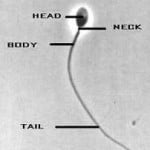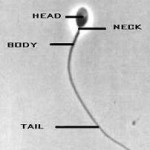
Not much credit is given to the sperm, with most of the focus being on the egg. However, male factors can be the cause of around 33% of all infertility. So why, then, do we not pay more attention to the sperm?

One reason is that sperm, unlike eggs, are continually produced throughout the male’s reproductive life, in a cycle known as spermatogenesis. Because of this continual production of sperm, males may see fluctuations in sperm count, morphology, and motility month to month.
Sperm are produced in the testicles. They then spend 60 to 90 days in the epididymis, where they grow to maturity. This process is highly sensitive to fluctuations in the environment, particularly hormones and temperature. Dietary deficiencies, lifestyle choices (steroid use, alcohol or drug use, smoking), x-ray exposure, and/or infectious diseases can also affect the production of sperm. This means that it IS possible to improve sperm parameters if certain changes are made.
Another reason that sperm is not given as much attention as the egg, at least from an IVF standpoint, is that with ICSI (intracytoplasmic sperm injection) even men with very low sperm counts and/or very abnormal sperm morphology can achieve fertilization. Using a very high powered microscope, normal sperm can be found and injected directly into the cytoplasm of the egg.
Before getting a semen analysis performed, it is important to remember that it takes about 75 days for sperm to develop and be ready for ejaculation. If you were ill, taking medication, or had anything unusual going on three months before the analysis, the results may not be indicative of a normal sperm count, motility, or production and you would want to try another semen analysis again to see if there were any changes to the sample.

Entire Website © 2003 - 2020
Karande and Associates d/b/a InVia
Fertility Specialists
